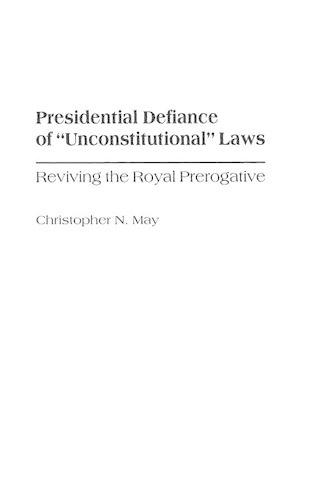
Presidential Defiance of Unconstitutional Laws: Reviving the Royal Prerogative
(Hardback)
Publishing Details
Presidential Defiance of Unconstitutional Laws: Reviving the Royal Prerogative
By (Author) Christophe May
Bloomsbury Publishing PLC
Praeger Publishers Inc
20th August 1998
United States
Classifications
Tertiary Education
Non Fiction
Constitutional and administrative law: general
342.7302
Physical Properties
Hardback
232
Description
Since the mid-1970s American presidents have, with growing frequency, claimed that they have the power to ignore any law they believe is unconstitutional. Beginning with a review of the English constitutional backdrop against which the U.S. Constitution was framed, this book demonstrates that the Founders did not intend to confer on the president a power equivalent to the royal prerogative of suspending the laws, which was stripped from the English Crown in 1689. The author examines each of the nearly 150 instances in which presidents from George Washington to Jimmy Carter have objected to the validity of a law, in order to determine whether or not the president then ignored the law in question. This examination of the historical record reveals that prior to the mid-1970s the White House only rarely failed to honor a law that it believed to be unconstitutional.
Reviews
Christopher May makes a clear and convincing case that the responsibility for deciding the constitutionality of a law lies not with the president but with the courts.-The Annals of the American Academy of Political and Social Science
May does an admirable job of discussing this increasingly important practice and its lack of support in the Constitution and precedent....this book is a valuable contribution to our growing understanding of the balance of power among the three branches of government and can be recommended to scholars of any of the three branches of government.-The Law and Politics Review
May's arguments are persuasive and his work is richly documented.... Through an examination of presidential vetoes, signing statements, and objections to previously enacted laws, May constructs a unique empirical record of presidential defiance....As for the future, Professor May's prescription supplies a fair compromise.-Books on Law, The Jurist
May's book is well-written, informative and extremely well-documented. There is just enough background and historical detail to enlighten us without permitting us to become bogged down in minutia...For anyone with and interest in Constitutional law and the tendency of the executive branch toward consolidation of power, Christopher May's book is highly recommended.-Free Speech Yearbook
This is an excellent study...This study is an initial effort likely to be cited in appellate briefs the next time presidential refusal to comply with a law that he or she believes is unconstitutional goes to the courts.-Choice
"Christopher May makes a clear and convincing case that the responsibility for deciding the constitutionality of a law lies not with the president but with the courts."-The Annals of the American Academy of Political and Social Science
"May does an admirable job of discussing this increasingly important practice and its lack of support in the Constitution and precedent....this book is a valuable contribution to our growing understanding of the balance of power among the three branches of government and can be recommended to scholars of any of the three branches of government."-The Law and Politics Review
"May's arguments are persuasive and his work is richly documented.... Through an examination of presidential vetoes, signing statements, and objections to previously enacted laws, May constructs a unique empirical record of presidential defiance....As for the future, Professor May's prescription supplies a fair compromise."-Books on Law, The Jurist
"This is an excellent study...This study is an initial effort likely to be cited in appellate briefs the next time presidential refusal to comply with a law that he or she believes is unconstitutional goes to the courts."-Choice
"May's book is well-written, informative and extremely well-documented. There is just enough background and historical detail to enlighten us without permitting us to become bogged down in minutia...For anyone with and interest in Constitutional law and the tendency of the executive branch toward consolidation of power, Christopher May's book is highly recommended."-Free Speech Yearbook
Author Bio
CHRISTOPHER N. MAY is the James P. Bradley Professor of Constitutional Law at Loyola Law School, Los Angeles. Before entering law teaching he was a Legal Services attorney in San Francisco. He is the author of several books, including In the Name of War: Judicial Review and the War Powers since 1918 (1989), which won the Alpha Sigma Nu National Jesuit Book Award.
